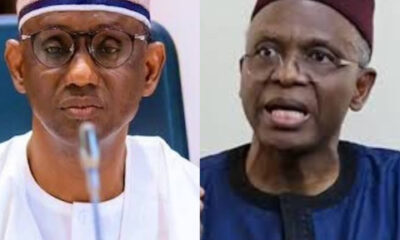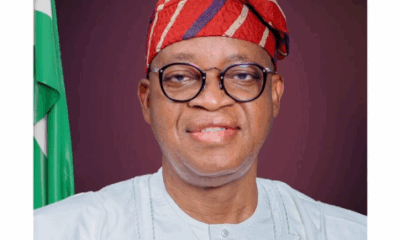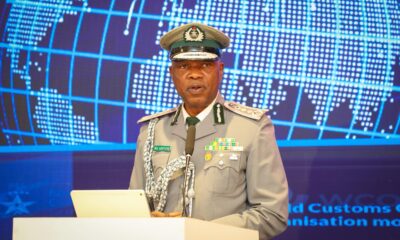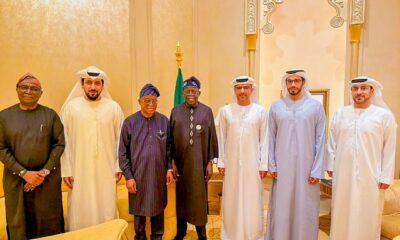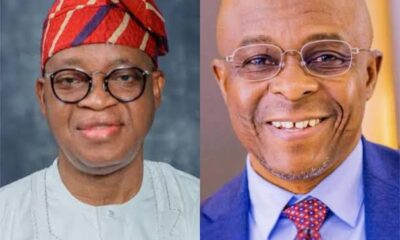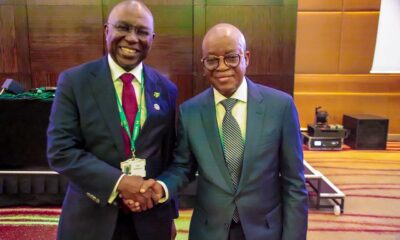Business Maritime
SILHOUTTE: Ill Proposed Bridging of Nigeria’s Revenue Generating Organs

BY EGUONO ODJEGBA
The proposal albeit secretly by President Bola Ahmed Tinubu’s Policy Advisory Council (PAC) to bring all revenue generating agencies under one body for ease of monitoring and efficiency is not only bereft of informed position but put the new government out as acting on rumours and ill advise.
It is least expected that the Tinubu administration which came onboard via a lifelong ambition should put the wrong foot out first in its fiscal and monetary policies. As the main lever of the national economy, this government must seek through informed input and engagement, improved machinery on ways to diversify and rejig its revenue farming and administration; as a clear departure from the immediate misrule of the past eight years.
While the state of emergency on revenue generation by this government is a welcome option, it cannot however be productive if established on quicksand which the obvious pathway, given PAC’s recommendation to knock the Federal Inland Revenue Service (FIRS), Nigeria Customs Service (NSC) and Nigerian Maritime Administration and Safety Agency (NIMASA) into a single body.
In furtherance to submissions made by the National Economy Sub-Committee, the policy will be aided by the passage of an Emergency Economic Reform Bill which will grant the President special powers to drive the economic reform agenda and support the delivery of sustainable and inclusive economic growth.
Amongst other consideration by the Council such as the removal of fuel subsidy, sale or concession of select government assets, transition to a transparent and unified foreign exchange rate system, is the planned deepening of tax collection and optimization of operating expenditure to reduce cost.
Whilst the suggestions and proposals sound fantastic and well intentioned, they appear simply not in tandem with reality. To begin with, PAC has shown that it grossly misunderstood the fundamental dynamics of some of the agencies as neither the NCS nor NIMASA are revenue making agencies in the strict sense of their functions.
Until their statutory functions are properly understood, no meaningful gains will come out of PCA’s proposed merger, and if anything, the merger will pass merely for a trial and error assembly which will not only distort the essential economic blueprint in dire need of proper overhaul by divesting some of the agencies with politically motivated duty and strange innovations in some of their so-called modernization projects, but further plunge the economy and hinder it’s productive system.
While NIMASA is strictly a maritime administration saddled with international cargo administration and safety, the core function of the NCS is trade facilitation, with its revenue component function as secondary duty; same for NIMASA which primary function is safety, even though it has the additional mandate to collect taxes and fees.
But who can really blame the Tinubu government for allowing itself to be lured into erroneous permutations by the years of misplaced priorities and inherently wrong focus by some of these agencies, whose politically inclined leaders have spared no efforts in subjugating the agencies as purely money making ventures to satisfy their politically motivated appointments.
The aberrations these political appointees have created so far have impaired efficiencies and professionalism in the respective agencies, it is even worse that otherwise knowledgeable professionals have also subsumed their professionalism under the mundane pursuits of political relevance.
Thus over time, the emphasis in Nigeria has been on revenue generation as against corporate governance and professionalism, with no conscious effort by the concerned agencies to refute these wrong suppositions.
According to an insider who does not want his name mentioned, “Nobody is refuting or repudiating such appellation and erroneous description. It has unfortunately stuck and we are in the current situation where a committee, apparently latching onto the popular belief went to the extent of recommending that Regulatory agencies be merged with the Revenue service.”
Apparently miffed, he asked, “Have we sank so low in knowledge and the public service is so bereft of courage to take a position refuting the convenient appellation? As much as we believe the politicians for creating the fiction that just because Government generate revenue from performing their statutory functions, they are revenue generating agencies, the public servants ought to have consistently objected to this mis-description by stating the correct position as it is according to the enabling legislations of the agencies”, adding:
“Due to this docility and inaction, the lie as Goebbel posited is now accepted generally as the truth and they would now be left with no option but to be defensive. The unfortunate thing is that most of the workers find it difficult to give a position paper to clear such misunderstanding of the jobs they are doing. “Some don’t even read the Acts establishing their organisation. They left others to define their job schedules and the mandates of their agencies. So, we shouldn’t blame politicians for conveniently holding on to what they believe is right.”

The situation is made worse by our media peculiarity that promotes lazy journalism which thrives on hearsays, infantile and ignorant opinions by diverse characters and opportunists who clothe themselves with the apparels of intellectuals and informed public stewards.
But let us return to the focus of today, while we return to that latter. It is strange and insulting to tie NIMASA function to revenue generation, because this is one agency whose critical role in international maritime trade and shipping diplomacy guarantees Nigeria’s participation in global trade and the continuous search for improved opportunities, security and safety outlook within and across our regional frontiers.
In the past two years, NIMASA has taken the blue economy initiative to an admirable height of purposeful participation, despite few teething challenges. These challenges are the areas this new government should ordinarily focus on at overcoming, and certainly not an attempt to shut in the agency’s primary assignment into closed cubicle of revenue reform.
The immediate concern of the Tinubu administration in NIMASA should be serious intervention in the development of indigenous shipping capacity, in addition to improving the protection of our marine environment from pollutions and natural disasters.
Nigeria need to improve on sustaining her integrity growth of international conventions and protocols already subscribed to as a core mandate for NIMASA, and there are assortments of them, designed to provide standards to regulate shipping and processes for marine safety; all of which lies within the MARAD framework.
The conventions are basically International Maritime Organisation (IMO) established, such the IMO four pillars, which comprise of the International Convention for the Safety at Sea (SOLAS), International Convention on Standards of Training, Certification and Watchkeeping for Seafarers (STCW), International Convention for the Prevention of Pollution from Ships (MARPOL) and Maritime Labour Conventions (MLC).
It is instructive that no MARAD is tied to everyday revenue obligation out of the 175 countries, and there is no reason NIMASA should be different. Unfortunately, the agency has produced successive leaderships that are not only hugely political in outlook but have fought to outdo one another in positioning NIMASA as revenue cash-cow while relegating its core function.
Rather than build operational and professional capacities, successive management of the agency channel the resources made from IGR to the federation coffers, all in the bid to attract political attention. Today, the Deep Blue Project (DBP) established to promote maritime safety and in part the Blue Economy is still struggling to find its root and to stabilize because funds that should drive the objectives are rather derailed to strange areas for political gambits, including a regime of questionable Corporate Social Responsibility(CSR) , while areas of critical attention are neglected.
If PAC is acting under the influence of the warped policy direction of the NCS under the leadership of Col. Hameed Ali (Rtd), perhaps they are justified, because this is one customs leader that came with the wrong mindset about the statutory function of the customs.
Deploying questionable support from his military background, Ali succeeded in militarizing the customs service entire task system, planting soldiers in all customs systems including the management and daily affairs of the service. He succeeded in emasculating customs trade facilitation function as secondary to revenue generation.
The emphasis on revenue generation has relegated its trade facilitation task, whittled down the service’s concern about national security, with the prevalence and rise of arms and ammunition in every nook and crannies of the country. Which officer will not occasionally look the other way just to be able to make enough to meet his revenue target? Something must give, there’s no two ways.
Added to the new frenzy to modernize customs operations, PAC and the president’s men have ears and have heard about the voodoo, power game that attended the Ali e-customs initiative, and cannot but imagine that the customs is a money making organ, where otherwise a foreign firm would have committed $300million upfront, for a service it is yet to commence executing.
Before this controversial Zainab Ahmed and Ali modernization racket, former finance ministers, Chief Anthony Ani and Ngozi Okonjo-Iweala respectively tried the same route with the Professional Import Duty Administrators (PIDA) and the Crown Agents of London proposals, both of which hit the rock as stakeholders resisted the moves.
But under the autocratic Buhari government, his appointees ran rough shod over the industry and imposed the e-customs under different controversial kits; some of which are still subject of litigation.
The efficiencies envisaged by the Tinubu government in the underlying PAC proposal is however a policy default that would become manifest after much damage may have been done.
The PBAT government is enjoined to stay action, giving speed to the proposal, and to have a broader study of the concerned agencies to be merged under the dubious and incorrect statute imposed on them by self serving leaders. The proposed mergers is a recipe for eventual job loss instead of job creation, neither will the envisaged efficiencies be achieved in the long run, since the permutations are wrongly been carried out, as with the erroneous tag of Customs and NIMASA being revenue concerns.

